八年级下册Unit9Period1课件
合集下载
八年级下册英语(人教)习题课件 Unit 9 第一课时 Secti
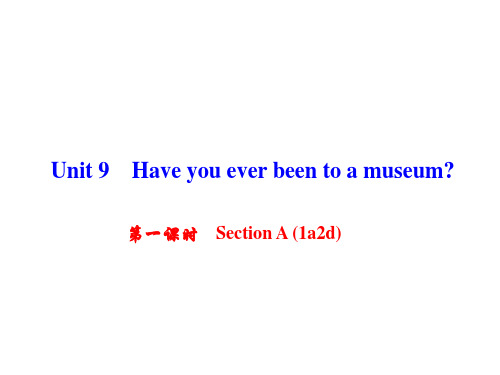
►Me neither.我也没去过。 Me neither.相当于“Neither+助动词/情态动词/连系动词be+主语”形式。 表示说话者的情况与上述否定句中所说的内容一样。Me,too.相当于“So +助动词/情态动词/连系动词be+主语”。Me,too.表示肯定,Me neither. 表示否定。 eg:Mary can't swim.Neither can I./Me neither.玛丽不会游泳,我也不会。 She likes playing basketball.So do I./Me,too.她喜欢打篮球,我也喜欢。
二、根据句意,用括号中所给单词的适当形式填空。 6.—Have you ever ____b_e_en_(be) to the city park? —Yes.I ____w_e_n(tgo) there last weekend. 7.How about _____g_o_i_n_g(go) there next weekend? 8.Neither of them ____c_o_m_(ecsome) from Japan.They are Chinese. 9.It's a great way ____t_o_s_p_e_n_d(spend) a weekend like that. 10.He put up a tent and ____s_l_e_p(tsleep) inside.
一、根据句意及首字母提示写单词。 1.I saw many famous paintings in the art _m__u_s_e_u_m_. 2.Paper is a great __in_v_e_n_t_io_n__of China. 3.I left my mobile phones_o_m_e_w__h_e_re_in the room.But I can't find it. 4.—Would you please take a photo for me with my__c_a_m__e_ra__? —Sure.One,two,three,cheese! 5.—Squares in cities are popular places of _a_m__u_se_m__e_n_t. —I think so.A lot of people are very happy there.
人教版英语八年级下册Unit9SectionB1a-1d课件

To preview the new words and expressions To preview the article about Singapore
water park. 13. I’_v_e _n_e_v_e_r b__ee_n_camping. 10. The most interesting museum I _’v_e_
_e_v_e_r _b_e_e_n_to is the American Computer
Museum. 11. I_’_v_e recently _b_e_e_n _to_ a very unusual
Pairwork
1d.What places have you been to? Ask your partner.
Have you visited…? Have you been to…? Have you seen…? Have you tried…?
课时重点回顾
Have you visited…? Have you been to…? Have you seen…? Have you tried…?
To learn the interview in 1b
A: Have you ever been to…? B: No, I haven’t. / No, never. How about you?
A: Me neither. / Neither have I.
the Great Wall
the Palac___ heard of Disneyland? A. always B. ever C. never
4. - ______ did you start skating? - Five years ago. A. When B. How long C. How often
Unit9《Haveyoueverbeentoanamusementpark_SectionA》课件1(39页)(人教新目标八年级下)
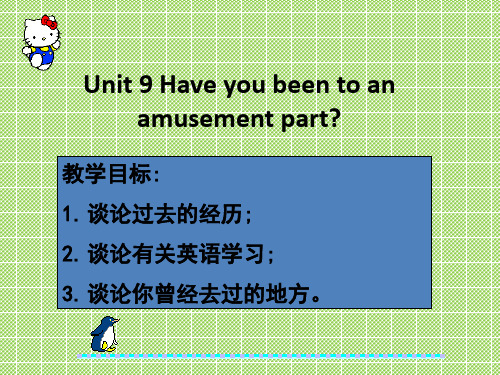
instead.
neither
(1) She isn’t a student. Neither am I (2) I can’t swim. Neither can he. (3) My husband doesn’t want to see a
movie tonight, and neither do I. (4) A: I haven’t seen that movie. Neither has he. (5)I didn’t go to school today. Neither did he ?
So 的用法
(1) She is a student, so am I (2) I can swim, so can he. (3) My husband wants to see a movie tonight, and so do I. (4) I have seen that movie, so has he. (5) I went to school today, so did he ?
2a Listen and circle the places you hear.
2b
Tina went to the space museum last year. John has never been to the space museum. They are going to take the subway. Linda has been to the aquarium. Linda went to the zoo three times last year. Linda is going to the zoo again next week. Harvey had a great time at Water World. Harvey’s friend has never been to W W. Harvey and his friend are going skating.
neither
(1) She isn’t a student. Neither am I (2) I can’t swim. Neither can he. (3) My husband doesn’t want to see a
movie tonight, and neither do I. (4) A: I haven’t seen that movie. Neither has he. (5)I didn’t go to school today. Neither did he ?
So 的用法
(1) She is a student, so am I (2) I can swim, so can he. (3) My husband wants to see a movie tonight, and so do I. (4) I have seen that movie, so has he. (5) I went to school today, so did he ?
2a Listen and circle the places you hear.
2b
Tina went to the space museum last year. John has never been to the space museum. They are going to take the subway. Linda has been to the aquarium. Linda went to the zoo three times last year. Linda is going to the zoo again next week. Harvey had a great time at Water World. Harvey’s friend has never been to W W. Harvey and his friend are going skating.
Unit9SectionA1a-1c课件人教版八年级英语下册

Claudia Sarah √
√
√
√
√
√
音频 1b
Listening 2 Choose the best answer.
1.When did Sarah visit the National Science Museum?
A. Today B. Yesterday C. Last year 2. When did Claudia visit the nature museum? A. Last year B. Last summer C. Last school trip 3. What may the relationship be between the
two speakers? A. Friends B. Teacher and student
C. Mother and kid. 音频 1b
1c Read and complete the conversation.
A: Let’s go somewhere different today. B: OK. Where do you want to go? A: Have you ever been to the space
zoo
A:_H__a_v_e you ever_b_e_e_n_t_o_ an_a_m__u_s_e_m__en__t _p_a_r_k___? B:Yes, I_h_a_v_e__. How about you ? A:Me,__t_o_o__.
amusement park
water park
museum? B: No, I haven’t. How about you? A: Me neither. / Neitheraolin Temple
人教版八年级下册第九单元英语课件
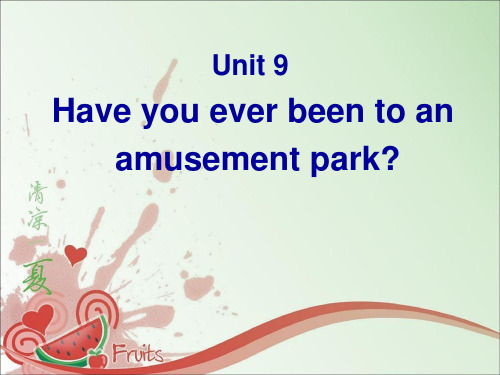
太空博物馆 游乐场 水族馆 动物园 水上公园
1b. Listen. Have these students ever been to these places?
Amห้องสมุดไป่ตู้sement park
Claudia
Water Space Aquarium Zoo park museum
√
√√
Sarah
√
√√
Ⅰ. 用括号中给出的词回答问题。
B. has; go
C. has; went
D. have; went
5. He hasn’t been to Beijing. He __ there next year.
A. goes B. went C. will go D. has been to
Thank you !
1. Have you seen Mrs. Tang these days? (yes) _____Y_e_s_,_I_h_a_v__e.___________________
2. Have you played kites this spring? (no) _____N_o_,_I__h_a_v_e_n_’t_._________________
3. I don’t like the two coats because ______ of them fits me. A. either B. all C. none D. neither
4. He__ been to Shanghai. He __ there last year.
A. have; go
1. --Have you ever been to ___ amusement park?
新人教版英语八年级下册Unit9单元总复习省公开课获奖课件说课比赛一等奖课件
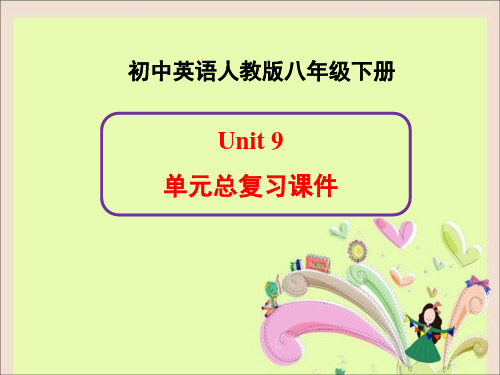
在夜晚 一年到头;终年
离……远 在黑暗中 在过去 去过某地
去不同旳地方 坐地铁 搭帐篷 多种各样旳
11. encourage sb. to do sth.
鼓励某人做某事
12. on the one hand... on the other hand.
一方面,另一方面
13. thousands of
B. also
C. either
D. neither
2. ______ people have lost their lives in this earthquake.
A. Thousands
B. Thousand of
C. Thousands of
D. Ten thousands
句型大闯关
3. _____ you like swimming, fishing _____ boating, you’ll
now等。 I have seen her before, but I can not remember where.
语法加油站
2. 三大句式旳使用方法区 别:
使用方法
例句
have/has been to 强调“去过”某地,人已经 I have been to Shanghai twice. 回来,背面可接表达次数旳 我去过上海两次。
语法加油站
单项选择。
1. — I’d like to introduce my best friend to you, Peter.
— Thank you, Lucy. But we __D___ already.
A. meet B. met C. will meet D. have met
外研版八年级英语下册 Module 9 Unit1 课件 (1)

• It will _________ the workers over a year _________ _________ the flyover.
• 4. It's very nice _________ you to get me two tickets _________ thep 1,2. 找出1--4句的短语 Group 3. 4找出5--7句的短语 Group 5. 6找出8--10句的短语 Group 7. 8找出1--4句的重点句子 Group 9.10 找出5--7句的重点句子 Group 11,12 找出8--10句的重点句 子
Language Points
elephants for their meat. • S: Absolutely ,but it’s hard to stop the
killing.
• L: Many animals have no place to live in.Our villages and farms are growing bigger ,and we’re taking away their lands and forests.
• L: Did you like the zoo ? • S: Yes,I was excited to see the pandas--• -at last . It was interesting to learn about
the Wolong Panda Reserve. • L:It’s sad to think about all those animals
• A. to clean B. cleaned C. clean D. cleans 2. It's hard for us _________ English well.
• 4. It's very nice _________ you to get me two tickets _________ thep 1,2. 找出1--4句的短语 Group 3. 4找出5--7句的短语 Group 5. 6找出8--10句的短语 Group 7. 8找出1--4句的重点句子 Group 9.10 找出5--7句的重点句子 Group 11,12 找出8--10句的重点句 子
Language Points
elephants for their meat. • S: Absolutely ,but it’s hard to stop the
killing.
• L: Many animals have no place to live in.Our villages and farms are growing bigger ,and we’re taking away their lands and forests.
• L: Did you like the zoo ? • S: Yes,I was excited to see the pandas--• -at last . It was interesting to learn about
the Wolong Panda Reserve. • L:It’s sad to think about all those animals
• A. to clean B. cleaned C. clean D. cleans 2. It's hard for us _________ English well.
英语人教版八年级下册Unit9全单元精品PPT课件

(c)
A: Have you been to … B: Yes, I have./No, I haven’t.
(d)
A: Have you been to … B: Yes, I have./No, I haven’t.
speak English and Putonghua
at night /in any season
Have Have
单词拼写。 1. I have never seen such a big_am_u_s_em_e_nt (娱乐 )
park. 2. It’s_un_be_li_ev_ab_le_ (难以置信的)that it’s snowing in
March in South China.
They have come into the room.
already: “已经”通常用于肯定句中。 I have already posted the letter.
有时,也用在疑问句中表示惊讶。
Have you eaten up all the food already ?
Yet:
“仍然,还 ” 用在疑问句和否定句 中。
__f_o_r___a week ____fo_r__a long time ___s_in_c_e_1997
___fo_r__two weeks _s_in_c_e___three years
ago __s_in_c_e__ last month
比较现在完成时和过去时的区别: *现在完成时所表示的是过去的行动所早成 的现在的情况。 *一般过去时表示的是过去发生的事实。
现在完成时不能和确定的过去 时间状语连用,如:yesterday, last year, in 1976,two days ago, just now… 但可以和一些不确定的时间状语连用,也 可和包括现在在内的时间状语连用,如:
人教版英语八年级下册Unit 9 - Section A教材全解知识点课件

D. wonderful somewhere
3a
• It's really interesting, isn't it? 这是一个反意疑问句。 反意疑问句是由“陈述部分+附加疑问部分”构成。 附加疑问部分常译为“是不是?”“不是吗?”“是吧?”“对吗?”等。
3a
• It's really interesting, isn't it? 这是一个反意疑问句。 反意疑问句是由“陈述部分+附加疑问部分”构成。 附加疑问部分常译为“是不是?”“不是吗?”“是吧?”“对吗?”等。 反意疑问句要遵循以下原则: ①前肯后否,前否后肯。即:陈述部分为肯定时,附加疑问部分为 否定;陈述部分为否定时,附加疑问部分为肯定。 We can go to the island by ship, can't we? Tom hasn't been to an amusement park, has he?
1a
• Let's go to one tomorrow. 辨析 one, that与 it ③it用于指代前文中提到过的同一事物。 -Do you like the game? -Yes, I like it.
- Nick, I lost my pen and I couldn't find ________ anywhere. - There are many pens in that box. Just take_______. A. it;it B. it; one C. one;it D. one; one
1a
• Me neither. 我也没去过。 Me neither.常用于口语中,意为“我也没/不.....” 此处相当于“Neither have I.”或“I haven't, either.“ Sb./Sth. + neither. 表示前面所述的否定情况也同样适合于其他人或物。 - Lucy can't play the guitar. - Me neither. [拓展]“Me too."意为“我也一样/我也如此” Sb./Sth. +too.表示前面所述的肯定情况也同样适合于其他人或物 - She likes shits made of silk. - Me too.
人教版八年级下册Unit 9 Have you ever been to an amusement park 第一课时课件
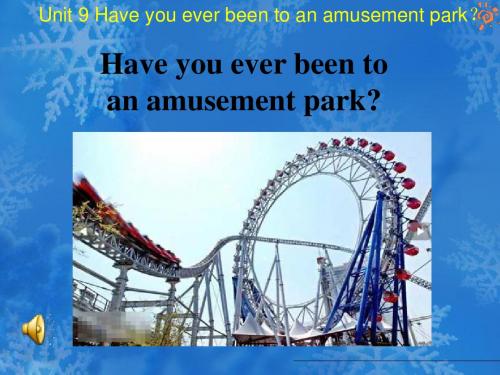
Unit 9 Have you ever been to an amusement park? Ask your classmates whether(是否) Survey &report they have been to these places.
Space Water Name Aquarium Zoo Museum World
[ ’nið ə / ’n ð ə]
Unit 9 Have you ever been to an amusement park?
1、How many places do they mention? Five. 2、Have they ever been to these places? Space museum Claudia Aquarium Zoo
--Have you ever by westlife
Summary
have/has been to: (曾经)去过(已回来)
I have been to a water park.
I have been to a space museum.
Unit 9 Have you ever been to an amusement park?
1. Recite the new words of P68-69. 2. Write your own conversatioБайду номын сангаас according to 1a.
Aixi Lake Bridge Bayi Square Nanchang Zoo
Unit 9 Have you ever been to an amusement park?
Question: Do you know where it is?
新目标英语八年级下册_unit9_单元课件 (1)
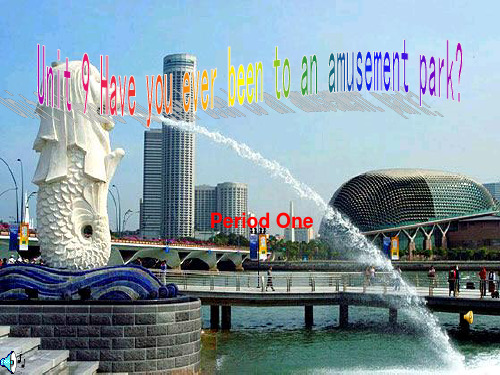
Period Three
magician(魔术师)
I have ever been to visit many cities in China. My favorite city is Hong Kong.
There are so many fun places in Hong Kong!
Disneyland
( B ) 4. Kate’s never seen Chinese movies, _____? A. hasn’t she B. has she C. isn’t she
D. is she
( C ) 5. “Mum, may I go out and play basketball?” “_____ you _____your homework yet?” A. Do, finish B. Are, finishing C. Have, finished
想象汉语当中如何表达过去的时间当中 已经开始做并且现在仍在进行的动作?
我早就开始学习英语了。
妈妈还在忙着打扫卫生。
我打羽毛球已经两年了。 我以前从来没有去过北京。
英语当中表达已经发生并且还在进行的动作的方式
1.Have you ever been to 你曾经去过海洋馆么? the aquarium?
Neither
①
②
③
adj./pron./adv. adv. 也不 1). Me neither. 2). neither + be/助动词 + 主语 e.g. 他不是医生,我也不是。 He isn’t a doctor. Neither am I. 我不喜欢苹果,她也不。 I don’t like apples. Neither does she. 我还没有完成作业,他也没有。 I haven’t finished my work. Neither has she pron. 两者都不 Neither of us likes apples. adj. 两者都不 Neither his parents likes apples.
人教八年级下册unit 9- unit 10 重点单词课件(共34张PPT )
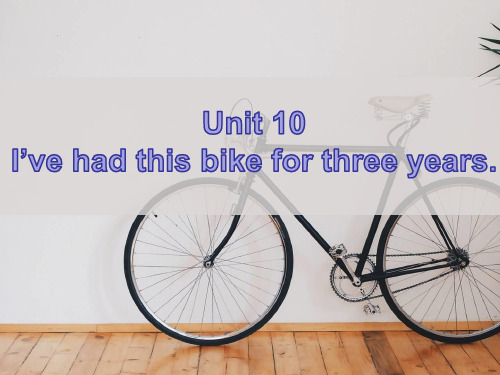
他们高兴地聊了一会儿。
2) He kept in touch with us while he was on vacation. 他在度假期间仍与我们保持联系。
truthful adj. 诚实的;老实的 e.g. He was not always truthful.
他并非总是说真话。
shame 【u】意为“羞耻;羞愧;惭愧” 【c】与a连用,表示“可耻的人或事; 可惜(遗憾)的事”。
bread maker(s) 面包机
scarf n. 围巾 复数为:scarves/ scarfs
soft toy(s) 布绒玩 具
board game(s) 棋类游戏
check v. / n. 检查,审查
check out 察看,观察 check in 登记,报到
check into 登记入住 (旅馆、医院等)
= Jack isn’t a student any longer/
any more (anymore).
【语境运用】同义句转换。 1) Tom is no longer a middle school
student. Tom isn’t a middle school student any
longer / any more / anymore. 2) He doesn’t live here any longer.
regard及物动词,意为“将······认为; 把······视为”。常用短语 regard…as…意为“将······视为······; 把······当做······”,as为介词,其后接 名词或代词。
e.g. I regard you as my best friend. 我把你当做我最好的朋友。 We regard him as our brother. 我们把他当成兄弟看待。
八年级英语下册Unit9Have you ever been to a museum 教学课件_

A. study B. studies C. to study D. studying 2. 他的话鼓舞了我。
His words _e_n_c_o_u_r_a_g_e_d_ _m__e_.
5. Have you tried Chinese food? 你品尝过中国食品吗?
try vt.品尝;尝。后接名词作宾语。
◎Practice 1. 这项工作进展迅速。
The work is _p_r_o_g_re_s_s_in__g rapidly. 2. 最近我英语进步很大。
I have _m_a_d__e __g_r_e_a_t_ __p_r_o_g_r_e_s_s__ in English recently.
4. It also encourages governments and social
◎Contrast: both/either/neither a. both意为“两者都”,一般用于肯定的陈述句。 与of连用作主语时,其后谓语动词用复数形式; 作定语时,其后常跟名词的复数形式。 b. either意为“两者之一;两者中任一个”。用 作主语时,其后谓语动词用单数形式;用作定 语时,只修饰可数名词的单数形式。还可以用 于否定句中表示“也”,这种用法与肯定句中 的too相对应。
(3)seem to do sth.
(4)It seems that来自clause①They seem (to be) the criminals wanted. 他们好像是被通缉的犯罪分子。
②It seems like years since I last meet you. 自从上次与你邂逅, 似乎已时隔多年。
of my little brother. 自打我小弟弟出生,我们就一直这样生活。
His words _e_n_c_o_u_r_a_g_e_d_ _m__e_.
5. Have you tried Chinese food? 你品尝过中国食品吗?
try vt.品尝;尝。后接名词作宾语。
◎Practice 1. 这项工作进展迅速。
The work is _p_r_o_g_re_s_s_in__g rapidly. 2. 最近我英语进步很大。
I have _m_a_d__e __g_r_e_a_t_ __p_r_o_g_r_e_s_s__ in English recently.
4. It also encourages governments and social
◎Contrast: both/either/neither a. both意为“两者都”,一般用于肯定的陈述句。 与of连用作主语时,其后谓语动词用复数形式; 作定语时,其后常跟名词的复数形式。 b. either意为“两者之一;两者中任一个”。用 作主语时,其后谓语动词用单数形式;用作定 语时,只修饰可数名词的单数形式。还可以用 于否定句中表示“也”,这种用法与肯定句中 的too相对应。
(3)seem to do sth.
(4)It seems that来自clause①They seem (to be) the criminals wanted. 他们好像是被通缉的犯罪分子。
②It seems like years since I last meet you. 自从上次与你邂逅, 似乎已时隔多年。
of my little brother. 自打我小弟弟出生,我们就一直这样生活。
外研版英语八年级下册Module9 Unit 1课件(共74张PPT)

2. 告诉我问题是什么时候开始(出现)的。 Tell me _w_h_e_n_ _t_h_e _p_r_o_b_l_e_m_ _s_t_a_r_te_d_. 3. 我可以问一下你是否向她提及过此事吗? Could I ask _if_/_w__h_e_th__er_ _y_o_u_’v_e_ _m__e_n_ti_o_n_e_d_ this to her?
Step 2 语境•悟 *We got separated when we went to different schools last term. 上学期我们去了不同的学校, 分开了。(P72)
*He separated the big eggs from the small ones. 他把大鸡蛋和小鸡蛋区分开来。 *The children sleep in separate beds. 孩子们都睡在各自的床上。
4. 你知道她为什么那样对待你吗? Do you know _w_h_y_ _sh__e _tr_e_a_t_s you like that? 5. 尽量弄清楚没有你她是否觉得孤独。 Try to find out _w_h_e_t_h_e_r_/_i_f _s_h_e _fe_e_l_s lonely without you.
Ⅲ. Read Activity 3 and answer the questions 1. Who is calling the Friendship Helpline? _L_i_n_g_li_n_g_. 2. Are Lingling and her best friend at the same school now? _Y_e_s_,__th_e_y__a_r_e.__
14. 对……有耐心 _b_e_p_a_t_ie_n_t__w_i_th_ 15. 和……交朋友 _m_a_k__e_f_r_ie_n_d_s_w__it_h__sb__. 16. 把……介绍给某人 _in_t_r_o_d_u_c_e_._._._to__s_b_. 17. 参加 _jo_i_n__in_ 18. 没什么, 没关系 _n_o_p_r_o_b_l_e_m_
人教版初二八年级英语下册 Unit 9 Have you been to an amusement park PPT课件

现在完成时与一般过去时的区别:
• 现在完成时:表示过去发生或已经完成的某一动 作对现在造成的影响或结果,或从过去开始一直延 have / has + V过去分词 续到现在的动作或保存的状态,强调的是现在的情 况,不能和表示过去的时间状语连用(如:in 1990, last Sunday 等)。 • 一般过去时:一般过去时只表示过去的动作或状 态,和现在不发生关系(即动作或状态在现在已经 结束),它可以和表示过去的时间状语连用。
T
T T
Listen again and circle T or F.
Conversation 2
Linda has been to the aquarium.
Linda went to the zoo three times last year. Linda is going to the zoo again next week.
F
T F
Listen again and circle T or F. Conversation 3
Harvey had a great time at Water World.
Harvey’s friend has never been to Water World. Harvey and his friend are going skatinse students ever been to these places?
Amusement park Water park Space museum
Aquarium
Zoo
Claudia
√
Sarah
√
√ √
√ √
Look at the map of the town. Listen and circle the places you hear.
相关主题
